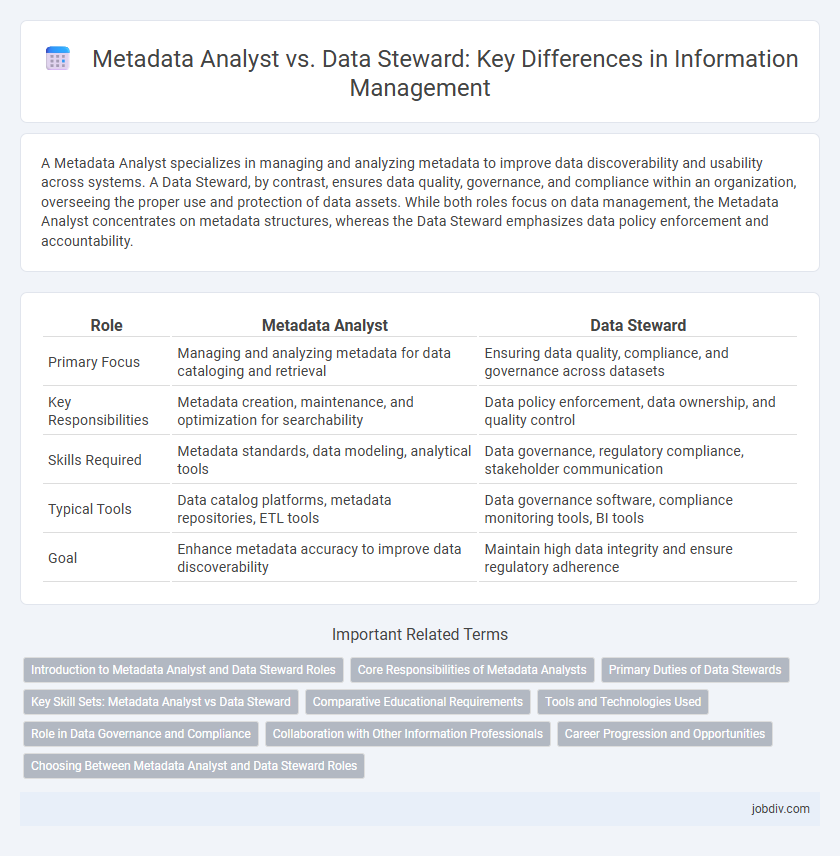A Metadata Analyst specializes in managing and analyzing metadata to improve data discoverability and usability across systems. A Data Steward, by contrast, ensures data quality, governance, and compliance within an organization, overseeing the proper use and protection of data assets. While both roles focus on data management, the Metadata Analyst concentrates on metadata structures, whereas the Data Steward emphasizes data policy enforcement and accountability.
Table of Comparison
| Role | Metadata Analyst | Data Steward |
|---|---|---|
| Primary Focus | Managing and analyzing metadata for data cataloging and retrieval | Ensuring data quality, compliance, and governance across datasets |
| Key Responsibilities | Metadata creation, maintenance, and optimization for searchability | Data policy enforcement, data ownership, and quality control |
| Skills Required | Metadata standards, data modeling, analytical tools | Data governance, regulatory compliance, stakeholder communication |
| Typical Tools | Data catalog platforms, metadata repositories, ETL tools | Data governance software, compliance monitoring tools, BI tools |
| Goal | Enhance metadata accuracy to improve data discoverability | Maintain high data integrity and ensure regulatory adherence |
Introduction to Metadata Analyst and Data Steward Roles
Metadata Analysts specialize in organizing and managing metadata to enhance data discoverability and usability across enterprise systems. Data Stewards oversee data governance, ensuring data quality, compliance, and accurate documentation aligned with organizational policies. Both roles play crucial parts in maintaining reliable and accessible data assets, supporting effective decision-making.
Core Responsibilities of Metadata Analysts
Metadata analysts specialize in managing and optimizing data definitions, standards, and taxonomies to ensure consistency and accuracy across organizational data assets. They develop and maintain metadata repositories, facilitate data lineage tracking, and implement data governance frameworks to enhance data discoverability and usability. Their core responsibilities also include collaborating with data stewards to enforce metadata policies and support business intelligence initiatives.
Primary Duties of Data Stewards
Data Stewards are primarily responsible for ensuring data accuracy, consistency, and security across organizational systems by managing data entry processes and validating information quality. They implement data governance policies, enforce compliance standards, and facilitate communication between data owners and users to maintain data integrity. Their role includes auditing data usage and providing guidance on best practices to support effective data management and decision-making.
Key Skill Sets: Metadata Analyst vs Data Steward
Metadata Analysts excel in data cataloging, metadata standards enforcement, and semantic data modeling, enabling efficient data discovery and usage. Data Stewards specialize in data governance, quality assurance, and compliance management to ensure data integrity and regulatory adherence. Both roles require expertise in data management tools, but Metadata Analysts focus more on metadata structuring while Data Stewards prioritize policy implementation and data lifecycle management.
Comparative Educational Requirements
Metadata Analysts typically hold degrees in information science, computer science, or data management, emphasizing skills in metadata standards, data modeling, and database technologies. Data Stewards often have educational backgrounds in business administration, information systems, or data governance, with additional certifications in data quality and compliance frameworks. Both roles benefit from ongoing professional development, but Metadata Analysts prioritize technical expertise, while Data Stewards focus more on organizational policies and data governance principles.
Tools and Technologies Used
Metadata Analysts primarily utilize tools like Collibra, Alation, and Apache Atlas for metadata management and governance, enabling efficient data cataloging and lineage tracking. Data Stewards often engage with data quality platforms such as Informatica Data Quality, Talend, and IBM InfoSphere to ensure data accuracy, consistency, and compliance across systems. Both roles rely on SQL, Python, and cloud-based platforms like AWS Glue or Azure Data Catalog to integrate, automate, and manage data workflows effectively.
Role in Data Governance and Compliance
Metadata Analysts specialize in managing and analyzing metadata frameworks to ensure data is accurately cataloged and easily retrievable, playing a critical role in supporting data governance strategies. Data Stewards enforce data governance policies by overseeing data quality, privacy, and compliance requirements across organizational data assets. Both roles are essential in maintaining regulatory compliance and establishing effective data management practices within enterprises.
Collaboration with Other Information Professionals
Metadata Analysts collaborate closely with Data Architects and Business Analysts to ensure accurate data definitions and consistent metadata standards across systems. Data Stewards work in partnership with Data Owners and Compliance Officers to maintain data quality, governance, and regulatory compliance throughout the data lifecycle. Both roles require ongoing communication with IT teams and stakeholders to align data management practices with organizational goals.
Career Progression and Opportunities
Metadata Analysts specialize in managing and organizing metadata to enhance data accessibility and usability, often progressing towards roles such as Data Governance Manager or Metadata Manager. Data Stewards oversee data quality, compliance, and policy implementation, with career paths leading to Data Governance Officer or Chief Data Officer positions. Both roles offer opportunities in data strategy development and cross-functional collaboration within enterprise data management frameworks.
Choosing Between Metadata Analyst and Data Steward Roles
Selecting between Metadata Analyst and Data Steward roles depends on organizational needs for data governance and quality. Metadata Analysts specialize in documenting, managing, and analyzing metadata to improve data usability and discoverability, while Data Stewards focus on ensuring data accuracy, compliance, and security within specific business domains. Understanding the distinction aligns responsibilities with strategic goals, optimizing both metadata management and data stewardship functions.
Metadata Analyst vs Data Steward Infographic

 jobdiv.com
jobdiv.com